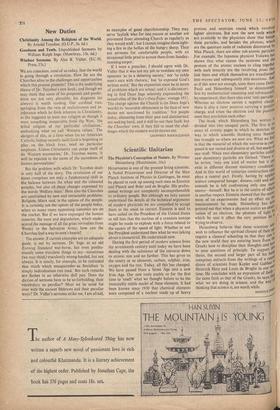Scientific Unitarian
The Physicist's Conception of Nature. By Werner Heisenberg. (Hutchinson, 16s.) HEISENBERG is one of the greatest living scientists. A Nobel Prizewinner and Director of the Max Planck Institute of Physics in Gottingen, he must be placed in rank up among such men as Einstein and Planck and Bohr and de Broglie. His profes- sional writings are completely incomprehensible to ordinary people. But although we laity cannot understand the details of the technical arguments of modern physicists we are compelled to accept them in the main as correct. Einstein is said to have called on the President of the United States to tell him that the nucleus of a uranium isotope might be made to explode with a force related to the square of the speed of light. Whether or not the President understood then what he was talking about is immaterial. He understands now.
During the first period of modern science from the seventeenth century until today we have been dealing with the substance of the universe down to atomic size and no farther. This has given us the ninety or so elements, carbon, sulphur, iron, oxygen and the rest. Today, all this has changed. We have passed from a Stone Age into a new Iron Age. Our new tools enable us for the first time to 'smelt' what we thought before to be the immutably stable nuclei of these elements. It had been known since 1930 that chemical elements were composed of a nucleus made up of heavy
protons and neutrons round which revolved lighter electrons. But now the new tools which are available to the physicists show that beSide these particles, and besides the photons, which are the quantum units of radiation discovered by Max Planck, there are other sub-atomic particles. For example, the Japanese physicist Yukawa has shown that what causes the neutrons and the protons of the atomic nucleus to cling together with such tenacity are the revolving pions that link them and which themselves are transformed into moons and subsequently into neutrions. And as if this were not enough, soon there came Dirac, Pauli and Heisenberg himself to demonstrate, first by mathematical reasoning and subsequentlY, by experiment, that there also exist 'anti-particles. Whereas an electron carries a negative charge, there is also a rarer positron carrying a positive , charge, and when the electron and the positrne meet they annihilate each other. The book Which Heisenberg has written i5 divided into two unequal parts. The first is an essay of seventy pages in which he sketches the way in which scientific thinking since Newt(); has brought us where we now -are. What we findw is that the material of which the universe is Fotn; posed is not varied and diverse at all, but made e` one -stuff. When two elementary particles collide, new elementary particles are formed. 'There is, he writes, 'only one kind of matter but it eee, exist in different discreet stationary conditions. And in this world of unitarian construction rnefn plays a central part. Firstly, having by apeliej science conquered hunger, disease, cold and Wild„ animals he is left confronting only one 010.! enemy—himself. But he is in the centre of affao' in another respect. Einstein showed that the move' ment of an experimenter had an effect on the measurements he made, Heisenberg has nod pointed out that when a physicist makes an obstr; vation of an electron, the photons of light v' which he sees it affect the very position he trying to observe.. Heisenberg believes that those scientists vill° wish to influence the spiritual climate of their 88ei require a classical schooling so that they can to the new world they are entering learn from Ow Greeks how to discipline their thoughts and h°,.:5 to pose questions of principle. To support ttli thesis, the second and larger part of his b001 comprises extracts from the writings of a ronn,0 dozen of scientists from Kepler and Galileo I, Heinrich Herz and Louis de Broglie in our or, time. He concludes with an expression of faith the same faith as that of the Greeks, he says, tho3f what we are doing in science, and the way thinking that science is, are worth while.


































 Previous page
Previous page